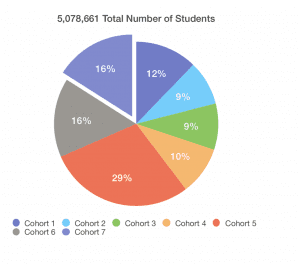September 15-October 15 is traditionally observed as Hispanic Heritage Month. We will feature stories from Hispanic Americans who will share their journeys, their struggles, and their successes.
By: Nancy Lewin, executive director, Association of Latino Administrators and Superintendents (ALAS) and Maria Vasquez, program director, ACT Center for Equity in Learning
 Maria: Growing up I never had any teachers that looked like me until my second year at the University of Texas. Reflecting back on what I had to go through in high school to get to the University of Texas was an uphill battle. I had several strikes against me. My family was poor so we lived in the wrong zip code. Yes – there was a high school for those students that lived in that part of town but when you examined the school closely, the class offerings for the college bound were limited or even non-existent. I had to find my own transportation to travel the 15 miles to the nearest high school that offered the classes I needed to apply to the local University.
Maria: Growing up I never had any teachers that looked like me until my second year at the University of Texas. Reflecting back on what I had to go through in high school to get to the University of Texas was an uphill battle. I had several strikes against me. My family was poor so we lived in the wrong zip code. Yes – there was a high school for those students that lived in that part of town but when you examined the school closely, the class offerings for the college bound were limited or even non-existent. I had to find my own transportation to travel the 15 miles to the nearest high school that offered the classes I needed to apply to the local University.
Later, as a college student I realized that a school district leader had made a decision to place high school teachers of advance coursework in the high schools in the correct zip code. Expectations were not high for the students in schools in the wrong zip codes. As a high school student I didn’t realize that this was my first introduction to the privileged world of living in the right zip codes. Decisions made by well-meaning administrators never took into consideration that equity in curriculum offerings in all schools was a right that every student had.
 Nancy: “Why is she here, she should be with Level 3!” This statement was a clear indicator of tracking that was representative of the system in place at my elementary school. These words from my peers were indicative that tracking was entrenched and even students knew the system. This was not a great welcome upon my returning from our seasonal migrant venture. The teacher spoke up for me and said that I did belong in the Level 1 homeroom assignment.
Nancy: “Why is she here, she should be with Level 3!” This statement was a clear indicator of tracking that was representative of the system in place at my elementary school. These words from my peers were indicative that tracking was entrenched and even students knew the system. This was not a great welcome upon my returning from our seasonal migrant venture. The teacher spoke up for me and said that I did belong in the Level 1 homeroom assignment.
Who sets the climate and culture of a school? School district leaders do.
These leaders are responsible for setting priorities and are responsible for making certain that a quality education is provided to all students and that equity and opportunity are central to their work. Unfortunately, not all leaders have the capacity or perspective to do this well.
The Association of Latino Administrators and Superintendents (ALAS) is the national organization that serves to advocate for underrepresented and Latino students, provide resources, networking and best practices for school district leaders, as well as developing individuals to take on the school superintendent leadership roles across the country.
The greatest barriers to equity are access and opportunity. Students who do not have access to courses that truly prepare them for career and college success miss out on acceptance at universities and other prospects. The opportunity to have quality instruction and programming are prioritized through strategic planning; however, often times the leader is not equipped to meet the needs of all students.
ALAS established the Superintendent’s Leadership Academy (SLA) in 2003 to train and help aspiring superintendents learn how to lead school districts with a growing Latino student population. ALAS approached ACT for the possibility of a partnership. ACT accepted the invitation on this new endeavor since both organizations have similar missions to improve education outcomes for students and their families.
The Superintendent’s Leadership Academy is a highly competitive yearlong program that pairs the SLA participant with a mentor superintendent and a support system to ensure completion of the program and success in their home districts.
 This past May, the academy graduated its seventh cohort of SLA administrators. ALAS has now trained over 100 administrators and a quarter of those graduates are now in superintendent roles. The rest are in key leadership roles within their school districts. We are also proud that these administrators made a difference in the lives of over five million students.
This past May, the academy graduated its seventh cohort of SLA administrators. ALAS has now trained over 100 administrators and a quarter of those graduates are now in superintendent roles. The rest are in key leadership roles within their school districts. We are also proud that these administrators made a difference in the lives of over five million students.
Until ALAS created this leadership program, there weren’t any leadership programs that specifically addressed the challenges that Latino students are having in the public school system.
If we believe in education, we must also believe in the urgency to truly meet the needs of all students and leaders. The only way to do this is to understand equity and how to fully prepare both students and leaders for success.
Dr. Nancy Lewin is the Executive Director of the Association of Latino Administrators and Superintendents (ALAS). She has served 23 years as a professional educator, and brings deep experience to the Chief Executive role at the nation’s largest Latino-focused education leadership organization. Since taking on the role of executive director for ALAS, Dr. Lewin has significantly expanded the organization’s national presence, created a legislative agenda platform to advocate for critical issues impacting the Latino education community, and implemented an annual national Legislative Assembly event.
Maria Vasquez is a program director in ACT’s Center for Equity in Learning. Maria works with existing and new networks of school leaders and national organizations to fulfill ACT’s mission of helping people achieve education and workplace success.
